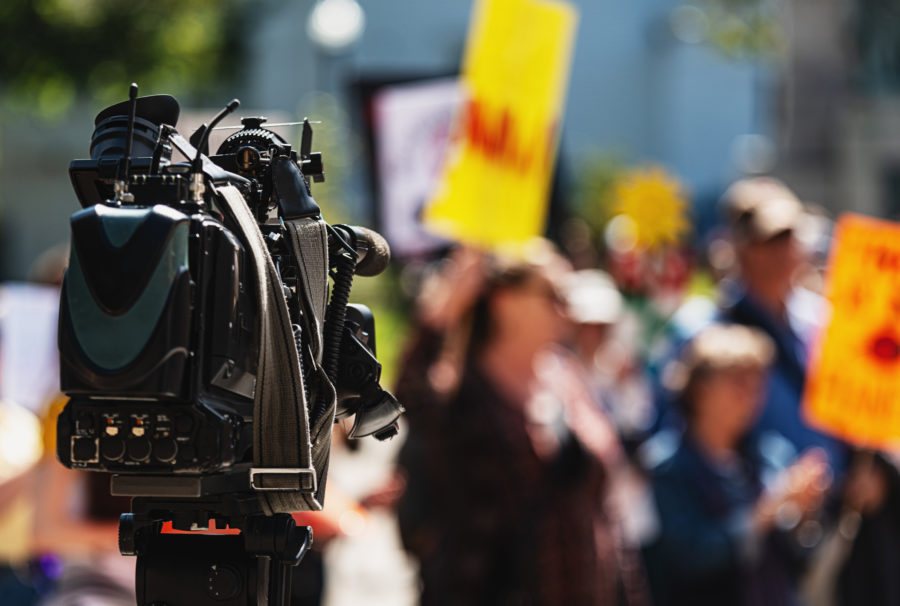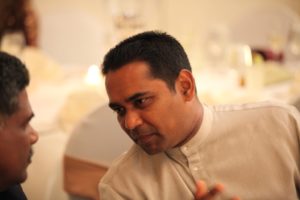9th December 2020
The frontline of defending media freedom

Around the world, media freedom is under attack. In the last decade, over 1000 journalists and media workers have been killed. They face a multitude of challenges, from violence to repressive laws. Yet, their role in our societies could never be more vital. In the battle between facts and falsehoods, journalists play a key role in keeping us informed so we can exercise our democratic rights. Without a free media power risks going unchallenged and the powerful becoming increasingly unaccountable.
On 16 November, the Foreign Secretary presented the Canada-UK Media Freedom Award to the Belarusian Association of Journalists (BAJ). But the work of so many other organisations deserves to be recognised. I am pleased to share with you a brief summary of a few individuals and organisations who have made real a difference to promoting media freedom, often at great personal cost. As the Foreign Secretary noted in his speech, the UK remains committed to defend media freedom globally. This includes using our global network, including through the Media Freedom Coalition, and development programming, to increase the costs to those who restrict it.
Centro de Investigación y Capacitación Propuesta Cívica, Mexico
According to public reports, Mexico is one of, if not the most, dangerous countries in which to be a journalist. In 2019 and 2020, Mexico accounted for 18 of the 96 cases of murders of journalists registered by UNESCO worldwide. In 2020 alone there have been five journalists murdered.
Propuesta Cívica has defended and promoted media freedom with a particular focus on trying to achieve justice for those journalists murdered just for doing their job. They achieved two prosecutions this year:
- championed the tragic case of Miroslava Breach, a Chihuahuan journalist murdered in front of her child in 2017. With the support of Propuesta Civica including legal advice, and after many delays in the investigation process and several challenges working with the authorities, a conviction and sentence of 50 years was obtained
- supported, since April 2018, the case of Sinaloan journalist Javier Valdez, who was assassinated on May 15, 2017. Throughout the years, it has offered legal advice, provided political support, made public statements and accompanied Javier Valdez’s family so they could be protected
Through their efforts, the battle against impunity has made progress and media freedom stronger.
SKeyes Media, Lebanon
The Middle East and North Africa is the world’s most dangerous region for journalists.
Founded in 2006, a few months after the assassination in Beirut of prominent journalist Samir Kassir, the SKeyes Center for Media and Cultural Freedom — an initiative by the Samir Kassir Foundation — has grown to become one of the most influential and respected media freedom organisations in the MENA region.
Its network of researchers and correspondents monitor all forms of violations targeting journalists and media professionals in Lebanon, Syria, Jordan and Palestine. More than 200 journalists from Syria, who had to flee their home, have transited through Beirut and received assistance from SKeyes.
In 2018, SKeyes launched the first and only safe hosting program for persecuted journalists from across the MENA region whichhas allowed, one of the most inspiring Yemeni photojournalists to find a safe haven ; a prominent Sudanese cartoonist to rebuild his life; and a group of Iraqi TV journalists to stay away from life-threatening risks after their network was raided and closed.
SKeyes has also provided hundreds of journalists with hostile environment and first aid training. Journalists who have been covering the conflict in Iraq since 2015 and others who experienced the tragic blast in the port of Beirut on August 4, 2020, have managed to perform all the necessary first aid measures they learned in SKeyes’s training to save their lives and those of their loved ones.
SKeyes led the most engaging communication campaigns against censorship and has worked with the human rights defenders in the region to demand the release of detained journalists and the protection of citizens’ privacy and digital rights. SKeyes is also dedicated to supporting the families of kidnapped journalists in Syria.
SKeyes believes that media cannot be truly free if not truly independent. This is why SKeyes is invested in supporting the emergence of independent, high quality, youth-led and oriented media across the region. More than 30 new comers to the media sector in Morocco, Algeria, Tunisia, Libya, Egypt, Lebanon, Palestine, Jordan, Syria, and Iraq have received training, funding or research support from SKeyes.
By protecting media freedom, SKeyes is contributing to saving lives, in a region where complacency towards authorities and the lack of in-depth reporting has resulted in tragic consequences.
Dr Ranga Kalansooriya, Sri Lanka
Dr Ranga Kalansooriya is one of Sri Lanka’s and the region’s pioneers in promoting safety of journalists, media freedom and freedom of expression.

Dr Kalansooriya initiated the first journalist safety program in Sri Lanka in 2006, while he served as Director General of the Sri Lanka Press Institute. The program included a safe house, safety fund and quick response mechanism for journalists under imminent threat. He led efforts to create networks to help save the lives of journalists who faced threats for carrying out their jobs.
Dr Kalansooriya was one of the first media development specialists to enter Myanmar when it reopened and supported media development programs such as media law reforms and the establishment of the Myanmar Press Council. He also designed and implemented the country’s first ever Rapid Training Program on Conflict Sensitive Journalism and Systematic Journalists Safety Program. He currently advises on the process for developing Myanmar’s National Plan of Action on Safety of journalists based on the UN Plan of Action.
Dr Kalansooriya took part in the first international fact finding mission to the Philippines after the Ampatuan Massacre in Mindanao in late 2009. He initiated a comprehensive safety program for journalists– led by the National Union of Journalists of the Philippines.
Dr Kalansooriya designed, developed and implemented Pakistan’s first systematic safety training program and initiated Indonesia’s first ever multi stakeholder collective “Committee to Protect Journalists” and is now in the process of designing a comprehensive safety program for Indonesia.
Through all of his actions, he is shining a global spotlight on media freedom, and ensuring the safety of journalists.